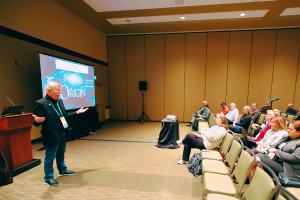
By Victor Price, Associate Registrar, University of Missouri-Columbia
One of the less frequent tasks we encounter as higher education officials is receiving requests for transcripts and diplomas to be processed for an Apostille. Current students and alumni, often living outside the U.S., need the Apostille. They soon realize it’s challenging to obtain this certification from a distance.
The process requires accessing multiple offices, paying for services, and paying shipping costs. With a little luck, it won’t get lost along the way.
Thomas C. Black, an Honorary Member of AACRAO, presented “OMG, Apostilles Have Changed! Thankfully for the Better”, and is a well-known expert on innovation in higher education. He asked for a show of hands on who completes Apostille requests, and about half of the audience raised their hands.
Mr. Black started by sharing the history of the Apostille. He provided a deep understanding of the Apostille from its origin in 1961 at the Hague Conference, what the members of the treaty were hoping to accomplish with the establishment of Apostille, and how they moved forward with their plan to simplify the authentication of documents.
After explaining the origins of the process, Mr. Black explained the differences between public and private documents and how that difference has historically been important to the authentication process. This is why the seal of the public notary is required for a private document to be eligible for an Apostille, which is only used for public documents.
The paper document-based Apostille process hasn’t changed in a very long time. In our offices, we still provide the ink signatures and seals on the documents, which we have done for decades. What has changed is the technology used in everyday life.
About 20 years ago, the first signs of changes began in the Apostille process. Mr. Black introduced two projects that were designed to incorporate technology into the process:
Revised Uniform Law on Notarial Acts: RULONA allows existing public notaries to become endorsed as an online notary. This allows the notary to certify digital documents from any state, not just within their own state.
e-APP is a project of the Hague Conference to develop an electronic PDF-based document for the Apostille process. The e-App process promises many advantages over the paper-based Apostille.
The audience also received a demonstration on how to search and verify an Apostille online using a sample from the State of Rhode Island.
The final theme of the session was about innovation and advocacy for change. We learned about the benefits that students and alumni would receive with an electronic Apostille process. But progress toward the electronic Apostille process has been very slow. Mr. Black used examples of other changes that were adopted, which were once unthinkable, such as digital signatures. He encouraged the audience to work for change by advocating for the digital process with our state authorities and continuing to take part in AACRAO advocacy initiatives.